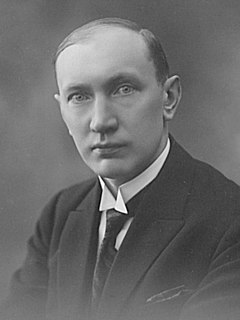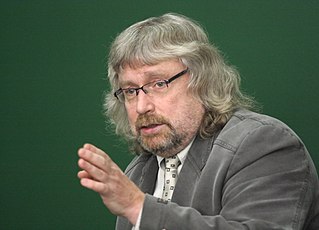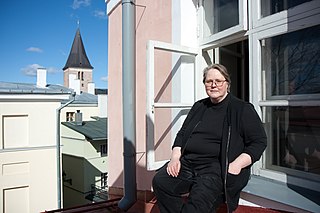Related Research Articles
Estonian is a Uralic language of the Finnic branch spoken in Estonia. It is the official language of Estonia, spoken natively by about 1.1 million people; 922,000 people in Estonia and 160,000 outside Estonia. It is a Southern Finnic language and is the second-most-spoken language among all the Finnic languages.

The University of Tartu is a university in the city of Tartu in Estonia. It is the national university of Estonia, and the only classical university in the country, and also the biggest and most prestigious university in Estonia. It was founded under the name of Academia Gustaviana in 1632 by Baron Johan Skytte, the Governor- General (1629–1634) of Swedish Livonia, Ingria and Karelia, with the required ratification provided by his long-time friend and former student – from age 7 –, King Gustavus Adolphus, shortly before the king's death on 6 November in the Battle of Lützen (1632), during the Thirty Years' War (1618–1648).

Konstantin Päts was the most influential politician of interwar Estonia, and served five times as the country's head of government. He was one of the first Estonians to become active in politics and started an almost 40-year political rivalry with Jaan Tõnisson, first through journalism with his newspaper Teataja, later through politics. He was condemned to death during the 1905 Revolution, but managed to flee first to Switzerland, then to Finland, where he continued his literary work. He returned to Estonia, but had to spend time in prison in 1910–1911.

Võro is a language belonging to the Finnic branch of the Uralic languages. Traditionally, it has been considered a dialect of the South Estonian dialect group of the Estonian language, but nowadays it has its own literary standard and is in search of official recognition as an indigenous regional language of Estonia. Võro has roughly 75,000 speakers (Võros) mostly in southeastern Estonia, in the eight parishes of the historical Võru County: Karula, Harglõ, Urvastõ, Rõugõ, Kanepi, Põlva, Räpinä and Vahtsõliina. These parishes are currently centred in Võru and Põlva counties, with parts extending into Valga and Tartu counties. Speakers can also be found in the cities of Tallinn and Tartu and the rest of Estonia.

Oskar Luts was an Estonian writer and playwright.

Tõnu Õnnepalu, also known by the pen names Emil Tode and Anton Nigov, is an Estonian poet, author and translator.

South Estonian is spoken in south-eastern Estonia, encompassing the Tartu, Mulgi, Võro and Seto varieties. There is no academic consensus on its status, as some linguists consider South Estonian a dialect of Estonian whereas other linguists consider South Estonian an independent Finnic language. Diachronically speaking, North and South Estonian are separate branches of the Finnic languages.
University of Tartu basketball team, is a professional basketball team based in Tartu, Estonia. The team plays in the Latvian–Estonian Basketball League. They play their home games at the University of Tartu Sports Hall.

The Estonian Students' Society is the largest and oldest all-male academical student society in Estonia, and is similar to the Baltic German student organizations known as corporations. It was founded in 1870 at Tartu. It has over 900 members in Estonia and abroad.

Paul Nikolai Kogerman was an Estonian chemist and founder of modern research in oil shale.
The Letter of 40 intellectuals, also The letter of 40, originally A public letter from Estonian SSR was a public letter dated October 28, 1980 and posted a week later, in which 40 intellectuals attempted to defend the Estonian language and expressed their protest against the recklessness of the Republic-level government in dealing with youth protests that were sparked a week earlier due to the banning of a public performance of the band Propeller. The real reasons were much more deep-seated, and had to do primarily with the Russification policies of the Kremlin in occupied Estonia.

Bernard Kangro was an Estonian writer and poet.
Ellakvere is a village in Jõgeva Parish, Jõgeva County in eastern Estonia. The village is known for the garlic grown there.

Lauri Vahtre is an Estonian politician, historian, translator and writer.

Urmas Sutrop is an Estonian linguist.

Aksella Hildegard Luts was an Estonian actress, screenwriter, dancer, choreographer, film editor and photojournalist.

Eduard Ahrens was a Baltic German Estonian language linguist and clergyman.

Marju Lepajõe was an Estonian classical philologist, translator and religious historian.
References
- ↑ "„Agenda Parva" - Eesti Entsüklopeedia". entsyklopeedia.ee. Retrieved 8 December 2020.